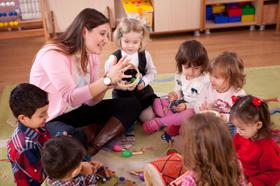Every parent believes his child is the smartest in the class, but what happens when you really do have a kid who is head-and-shoulders above the rest academically? Most teachers and parents believe that to adequately challenge these children, there must be accelerated programs to accommodate them. Hence, the gifted and talented program was born.
Children who belonged in this upper echelon were usually identified in the schools, by the teachers who worked with them every day. However, many parents also got quite busy behind the scenes, ensuring their children met the requirements for special programs that would increase their odds of success later in life. In fact, numerous children are receiving preparation for gifted and talented programs long before their feet even touch the hallowed halls of academia.
Track for Success
According to an article in , many residents of the Big Apple are whipping their children into academic shape as early as their preschool years. The competition for the limited number of slots in selective elementary schools across the city has led parents into a frenzy of preparation shortly after children learn to walk and talk. It is not unusual for parents to hire tutors and test their children's IQs long before enrolling them in New York schools.
Because the competition at many of these stellar schools is so stiff, few will look at children who test below the top three percent on standardized exams given for kindergarten admission. If a child is lucky enough to land a spot in a public or private school of this caliber, it puts him on the fast track for the rest of his academic career. A high average of students that graduate from these schools get into Ivy League schools after graduation, compared to students enrolled in basic public school programs.
Landing a Spot
With many more parents hopping on the "gifted" bandwagon, the New York Times reports that more children are qualifying for the accelerated program than ever before. According to a recent NYT report, qualifying students for the gifted programs in the state's public schools rose by 10% this year alone. The number of children qualifying for the elite citywide program increased by a third.
Of the children that took the test this past school year, 26% scored above the 90th percentile to qualify for a gifted and talented program. A large increase was also seen in the number of children who scored in the 97th percentile or higher, qualifying them for entrance into many of the elite schools across the city. The results indicate that parents may be getting more hip to preparing their children for the admission process, hiring tutors and snatching up practice tests to aid in the preparation process, as reported in the New York Sun.
However, the right test score does not guarantee admission into a program. In fact, higher test results have resulted in stiffer competition for the few slots available to academically gifted students. According to the New York Times article, the Brooklyn School of Inquiry in Gravesend brought in 540 parents for tours, but there are only 56 available slots. The principal of the school, Donna Taylor, told the NYT, "It's heartbreaking," referring to the growing anxiety among parents as they realize just how challenging it really was to gain entrance to the elite school.
Determining a Child's Fate
Despite the testing craze going on in New York and other communities today, does a test given when a child is four-years-old really determine his fate in life? While children who graduate from these elite primary and secondary schools may stand a greater than average chance of getting into the colleges of their choice, gifted and talented kindergarteners are not the only ones destined to succeed academically.
Taylor said that children who do not make the cut at her school would still be eligible for district-based gifted programs and had the option of enrolling in regular kindergarten programs around the state. Situations may change once the child is in school and begins to adapt to the academic grind, particularly in the case of male students.
A recent report on shows that more girls than boys are getting into the kindergarten gifted programs today. The difference is attributed to the verbal nature of the test, according to some experts. Since the verbal abilities of boys tend to develop later than girls, it puts the boys at a disadvantage at an early age. However, the gender trend is reversed in New York City's high schools, where more boys than girls are in the gifted programs. These numbers indicate that boys can still reap the benefits of an accelerated program at a later age.
Questions? Contact us on Facebook. @publicschoolreview














